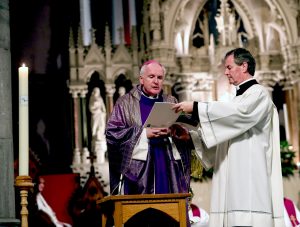
By Sarah Mac Donald - 04 September, 2018

Bishop Brendan Leahy reads from the ‘Limerick Diocese Pastoral Plan 2016–2026’. Picture: Keith Wiseman
A week on from Pope Francis’ visit to Ireland, the Bishop of Limerick has appealed to the faithful in his diocese to join in rebuilding a “Church at the service of Irish society”.
In his homily for the annual retreat of the Syro-Malabar community at Limerick Racecourse on Saturday, Bishop Brendan Leahy said he was making “a humble plea to all who want to begin with us again in a new way”.
He prayed that “the Spirit who heals will inspire us to repair and re-build our Church together”.
Recalling Pope Francis’ visit, he said clearly those who attended the papal ceremonies in Dublin and Knock have a deep love of their faith and the Church must continue to nourish that.
“The sins of the past cannot be allowed to cloud over that mission,” he said.
However, he said the Church also has an obligation to those “who feel alienated, hurt and disavowed by the grave crimes committed by clergy and religious”.
Dr Leahy said the Church must continue to meet and reach out to them. “We must repair the damage and pursue justice.
“We must do more to encourage those who have been abused in any way but have not already come forward, to report their abuse. We must do this to support them, help with healing if possible, identify those responsible and bring justice.”
Bishop Leahy added, “We can never accept that we are doing enough.”
As “huge strides have been made in safeguarding”, he suggested that the Church was increasingly closer to being the sanctuary that God would want.
He acknowledged the “lingering doubts about Church transparency” but highlighted that dioceses and religious orders in Ireland have opened their doors both to the National Board for Safeguarding Children in the Catholic Church and to the HSE, who had both issued audits.
“The Church must always co-operate fully with state authorities in this area,” he stressed.
“As for those who have abused in the Church, we need to continue our pursuit of truth, justice and healing. Most episodes of abuse stretch back into decades but if anyone has any information regarding anything relating to any member of clergy or religious, we need to know and, moreover, the authorities need to know.”
He made a direct appeal to “any member of the clergy or religious who is hiding some dark secret or intention in the area of abuse of minors” to come forward immediately and own up to this to state and Church authorities.
“Do not put yourself in a situation where the poison within can infect others. There is no place for this in God’s house,” he warned.
But Bishop Leahy also underlined that – without eclipsing the acknowledgement of the negative – “we need to be careful that we don’t pull ourselves down as a society, reading our past only in its negativity. That would be untrue to the past and not fair to the present and hamper future possibilities.”
The Irish Church, he suggested, is a Church that has faced the evil within, has worked tirelessly to cast it out and put stringent measures in place to protect against its return.
“But, it is, above all, a Church that is still out there, reaching those on the margins, people fighting homelessness, ill-health, bereavement, poverty and so much more.
“A Church that is accompanying millions day by day in all kinds of ways – from baptisms to weddings to funerals, building local communities and offering horizons of consolation, meaning and hope.
“I take all expressions, positive and negative, from this special time as an invitation; a collective voice that we must listen and respond to. The Pope has given us, as bishops in Ireland, a clear mandate to do this listening.”
He said the diocese of Limerick had begun the process through its Synod in 2016. “We must now, renewed by the energy and honesty of last weekend, go forward with great hope,” he said.
Admitting that he was “hugely heartened” by the hundreds of thousands who turned out for Pope Francis’ visit, he said it was an affirmation of the deep faith of people, their love of God, their deep spirituality and their mercifulness towards a Church that has, while enriching them in many ways, failed them badly in a most shocking way.
“There were many powerful moments along that all too brief 36-hour journey that touched us all; a mix of darkness and light and rightly so. There were the apologies and acknowledgements throughout of abuse in the Church; Pope Francis’ own words, deep and heartfelt, at public engagements. His words at his meeting with victims confirming his horror over what happened. Never has a Pope spoken with such passion using such strong words; never has a Pope connected on this level.
“It was not, of course, 1979 in terms of the numbers that celebrated. But this is not Ireland of 1979, nor is it the Church of 1979. Today it’s a Church that has gone through humiliation and purification. There was a blindness in the Church then as to what was lurking within but today our eyes are open.”